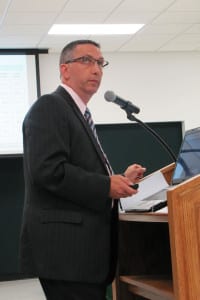By Andrea Paldy
After six years of controversy surrounding the adoption and implementation of Common Core and standardized tests associated with it, the New York State Education Department released a new draft of learning standards Sept. 21.
The proposed changes come as the department attempts to respond to ongoing criticism, while maintaining its stated goal of rigor and higher standards for students. The result could mean significant change to both English language arts (ELA) and math learning standards and a greater emphasis on communication with parents, students and educators.
Kevin Scanlon, assistant superintendent for educational services for Three Village said it’s too early to tell whether any of the changes will be fully implemented.
“So far it just seems to be cosmetic pieces,” Scanlon said at the meeting. “However, we need to delve a little further into it to see what potential impact it may have.”
He also said Three Village is providing feedback on the possible changes and will continue to work with the SED.
In a press release announcing the proposed adjustments, the state’s education department said its aim is to ensure that the new standards and their implementation are age-appropriate, particularly in primary grades. The new guidelines also propose additional teacher resources, guidance and professional development.
“These changes reflect what I have heard from parents, teachers and administrators over the past year in my travels across the state,” Education Commissioner MaryEllen Elia said in a prepared statement.
The draft committees, made up of more than 130 teachers, administrators, parents and college educators, volunteered from all regions of the state. They represent the “Big Five” districts — New York City, Buffalo, Rochester, Syracuse and Yonkers — as well as urban, suburban and rural districts throughout the state, Elia said. These committees are suggesting that glossaries be used to explain the value and expectations of the education department’s learning standards to all stakeholders.
The ELA draft includes a preface and introduction describing the learning standard’s role within a curriculum. The committee, which worked with a child development expert, proposes more emphasis on the importance of play-based learning in the primary grades. The ELA draft revisions also seek to streamline literary and nonfiction texts across grades, while reorganizing writing standards.
According to the draft document, math standards will be revised to clarify expectations “without limiting instructional flexibility.” Math committees also recommended clarifications to “better understand the goals of the learning standards, Elia said. The revisions seek to “define the progression of skills,” so that there is continuity and a connection from grade to grade. Other changes include creating a balance between skill comprehension, application and performance.
The recommendations of committee members — described by Elia as “dedicated” — are built, in part, on those of New York Gov. Andrew Cuomo’s (D) Common Core Task Force Report published in December, a public survey and feedback from discussions the commissioner had with parents and educators across the state.
The committees also worked with special education and English language teachers to address criticisms that the standards are not suitable for students in those areas.
Parents and others can comment on the draft standards on the department’s website — www.nysed.gov/aimhighny — through Nov. 4.













